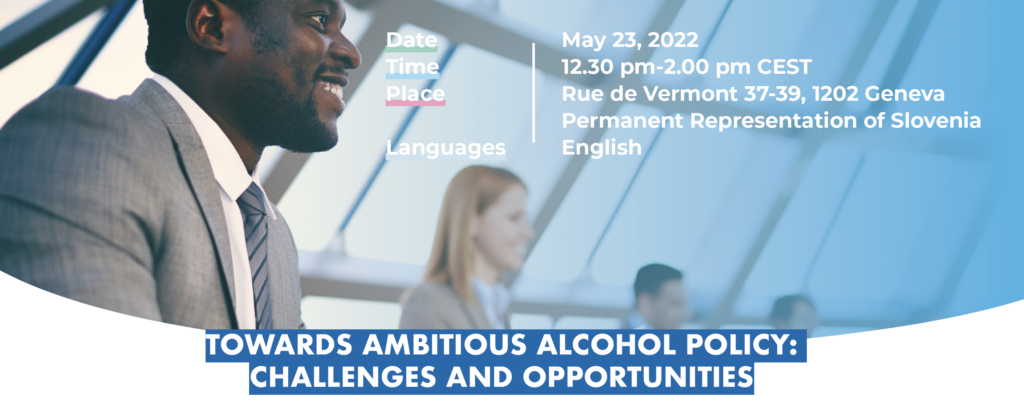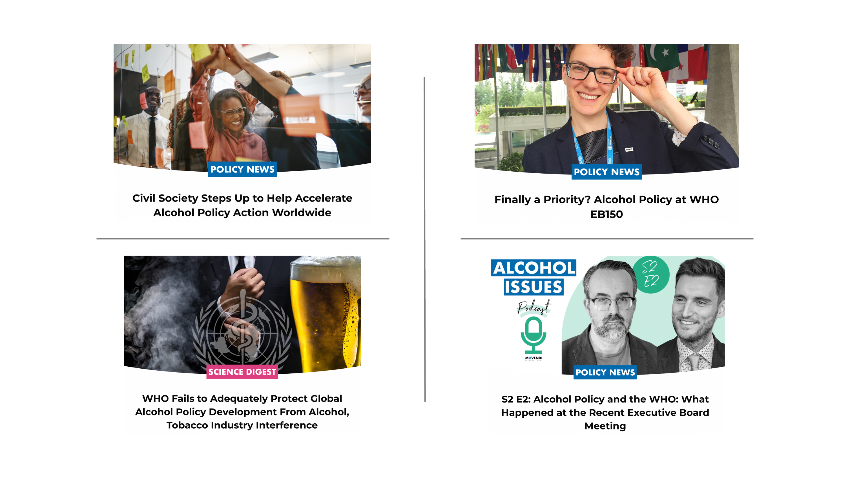
- This event has passed.
May 23 '22, 12:30 PM - 2:00 PM
Side Event WHA75
TOWARDS AMBITIOUS ALCOHOL POLICY: CHALLENGES AND OPPORTUNITIES

Date and time
May 23, 2022
12:30 – 14:00 CEST
Place
Permanent Mission of the Republic of Slovenia to the United Nations Office and other international organizations in Geneva,
Rue de Vermont 37-39, 1202 Geneva (5th floor)
- Lunch catering will be provided
- Web-streaming will be available
Registration
Due to the limited number of seats, please register your participation before the event by using this link.
Background
The decade after the adoption of the WHO Global Alcohol Strategy has not yielded significant progress in the development of alcohol policy solutions and reductions in alcohol harms.
Alcohol’s contribution to the global burden of disease has been increasing. In high income countries alcohol use is the second fasted growing risk factor and in LMICs it is the fourth fastest rising risk factor for the global disease burden.
Alcohol is the second largest risk factor for disease burden in the age group 10-24 years. Alcohol is the largest risk factor for disease burden in the group 25-49 years.
With some notable exceptions, most countries have failed to develop public health oriented alcohol policy in the last decade.
Modelling forecasts that global targets to reduce alcohol use and harm will not be met.
- Without action, Africa could see an increase in both the absolute number and proportion of people consuming alcohol, the amount consumed per capita and heavy episodic alcohol use.
- Southeast Asia has seen a 29% increase in per capita alcohol use since 2010.
- Out of 51 countries in the WHO European Region, only 16 reached the target of a 10% reduction of overall alcohol consumption between 2010-19. But 17 countries saw increases in alcohol use. Almost no progress was achieved since 2016 in the implementation of Best Buys alcohol policy solutions.
- Alcohol remains highly affordable in the WHO Americas region. Between 2012-16, per capita consumption among alcohol users only increased, with 1 in 5 alcohol users consuming heavily.
In the consultation process for the development of the draft WHO Global Alcohol Action Plan many countries have expressed the need for more ambitious and concerted action on alcohol to reach the NCDs and SDGs targets.
During the coming years, implementation of the new WHO Global Alcohol Action Plan will provide opportunities, but also challenges to save lives and improve health. The action plan is set to be adopted by the 75th World Health Assembly.
Objectives
This event aims to take stock of key challenges in developing and implementing evidence-based and ambitious alcohol policy solutions. How can those challenges be overcome?
The event will map the opportunities for advancing public health oriented alcohol policy with the help of the new WHO Global Alcohol Action Plan. What’s the role of alcohol policy to help build back better after COVID-19 and to help achieve the sustainable development goals?
The discussion will chart benefits of cross-border and international collaboration among member states, and the potential of technical support and normative guidance from the World Health Organization.
The event will outline the role of communities in the implementation of the global alcohol action plan to help ensure ambitious action and achieve progress that benefits all.
Audience
The target audience of this high-level WHA75 side event is member states participants in the WHA75, as well as leaders of civil society organizations and academia.
Program
Moderator: Prof. Ilona Kickbusch, founding director and chair of the Global Health Centre at the Graduate Institute of International and Development Studies in Geneva
- Welcome and opening by the host
- Opening remarks: Mr Janez Poklukar, Minister of Health of Slovenia
- Setting the scene, by moderator Prof. Kickbusch
- High-level panel with introductory remarks: Why does alcohol policy matter?
- Mr Tanel Kiik, Minister of Health and Labour of Estonia
- José Ruales, Viceminister of Governance and Public Health Surveillance, Ecuador
- Dr S. Somatunga, Additional Secretary, Public Health Services of the Ministry of Health, Sri Lanka
- Daniels Pavluts, Minister of Health of Latvia
- Dr. Emmanuel Ankrah Odame, Director Policy Planning Monitoring and Evaluation, Ministry of Health, Ghana, and
- Dr Roshan Pokhrel, Secretary, Ministry of Health and Population, Nepal
- Interactive panel discussion with perspectives from Member States and civil society: How to take the global alcohol action plan forward: Gaps, challenges, opportunities?
- Vesna Kerstin Petric, Director-General of the Directorate for Public Health at the Ministry of Health of Slovenia,
- Chawetsan Namwat, Director, Division of Disease Control in Emergency Situation, Department of Disease Control, Ministry of Public Health of Thailand
- Audrius Ščeponavičius, Director of Public Health Department, Ministry of Health of Lithuania,
- Prof. Jozef Šuvada, Prime Minister’s Adviser on Health, Advocacy and Science, Slovak Republic,
- Kristina Sperkova, International President, Movendi International,
- Simon Schönbeck, Board Member, UNF, Sweden, and
- Dag Rekve, Senior Technical Officer, Alcohol, Drugs, and Addictive Behaviors, World Health Organization
- Wrap-up and closing, by the moderator
Event flyer
Download the event flyer here.
For further reading and relevant background material
Access key resources about the WHO Global Alcohol Action Plan, about analysis of the lost decade in alcohol policy over the past ten years, and about the way forward.
Click the picture, or here, to access the resource page, providing podcasts, stories, and science digests.
From EB150 to WHA75
A decision unanimously adopted at the 150th of the World Health Organization’s Executive Board (EB150) meeting underlines that alcohol harm is a public health priority and that accelerated alcohol policy action has strong support from WHO Member States.
More than 100 countries were represented by 27 statements made during the debate. And five key themes emerged from the discussion on alcohol policy at the WHO EB 150.
WHO Executive Board Discusses Alcohol Policy, Adopts Global Alcohol Action Plan

